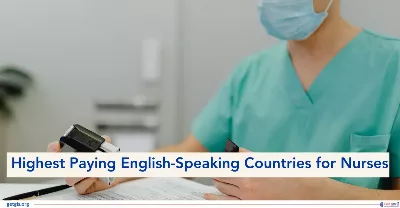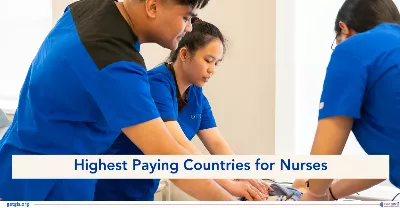Can I Get PR After 1 Year Master's in Canada in 2026?
Updated On
-
Copy link
Can I get PR after a 1-year master’s in Canada? Yes, it is possible to get PR in Canada, given that you pursue a 1-year master’s degree in Canada from a Designated Learning Institution (DLI), as it makes you eligible for a PGWP Canada.
Limited-time offer : Access a free 10-Day IELTS study plan curated for you

Table of Contents
- What You Need to Know About PR After 1-Year Master’s in Canada
- What are the Different PR Pathways After a 1-Year Master's in Canada?
- Why International Students in Canada Consider PR?
- What are the Challenges With a 1-Year Master’s and PR?
- How to Improve Chances of PR After a 1-Year Master's in Canada?
- Explore Your Canada PR Options With GetGIS
Many students planning their Master's in Canada often wonder, Can I get PR after a 1-year Master’s in Canada? The answer is yes, but there are some important conditions and steps that you would need to follow.
Along with the unique benefits of the education system in Canada, the immigration friendly policies have also greatly contributed to attracting millions of international students. In this article, we will explore how PR works for international graduates in Canada, the role of 1-year master’s programs, eligibility pathways, etc, to help maximize your PR chances in Canada.
What You Need to Know About PR After 1-Year Master’s in Canada
Yes, it is possible to get PR in Canada, given that you pursue a 1-year master’s degree in Canada from a Designated Learning Institution (DLI), as it makes you eligible for a Post-Graduate Work Permit (PGWP Canada), which is often the first step towards a student’s PR journey.
- PGWP Duration: If you complete a course that is at least 8 months but less than 2 years, you could be eligible for a PGWP Canada validity equal to your education program length. For example, studying a 1-year master’s program makes you eligible for a 1-year PGWP.
- Work Experience Requirement: To qualify for most of the PR pathways, like the Canadian Experience Class (CEC) under the Express Entry system, you usually need to have at least 1 year of full-time skilled work experience in NOC TEER (0, 1, 2, or 3) in Canada
What does this specify for international students applying for Canada PR? This means that with a 1-year PGWP, you will need to secure a full-time job offer after graduation to accumulate the 1-year work experience eligibility to apply for economic immigration pathways in Canada.
Also Read: Designated Learning Institution DLI Canada List
What are the Different PR Pathways After a 1-Year Master's in Canada?
The different Canada PR pathways for international students after completing a 1-year master’s in Canada in 2026 include:
1. Canadian Experience Class (CEC)
Under the Express Entry system, one of the most prominent pathways for international students in Canada is the Canadian Experience Class (CEC). Applicants under this pathway are ranked through the Comprehensive Ranking System (CRS) score, with the benefit of gaining extra CRS points for completing education in Canada. The CEC pathway requires candidates to have at least 1 year of full-time work experience in Canada in the last 3 years.
2. Provincial Nominee Program (PNP)
Many provinces have dedicated programs for international graduates, of which some even accept graduates of 1-year master’s programs without the mandatory need to have work experience. Like, for example:
- Ontario Masters Graduate Stream, which is specifically for master's graduates from Ontario universities (no job offer required)
- The British Columbia International Post-Graduate Category is for graduates in science, tech, engineering, and health jobs (no job offer required)
Also Read: 1 Year Master’s Programs in Canada for International Students
3. Quebec Experience Program (PEQ)
This pathway is specifically for international students studying in Quebec. Pursuing a master's degree in Quebec can make you eligible to apply for PR directly under the Quebec Experience Program (PEQ), given that you meet the French language requirements.
Why International Students in Canada Consider PR?
International students choose Canada not just for its education, but also for the long-term opportunities that PR brings along. Some of the key reasons to choose Canada for study in 2026 include:
- Canada consistently ranks among the top 5 countries for best quality of life (US News Report 2025), making it one of the desirable countries for international students to study, work, and settle permanently.
- More than 70% of international students apply for PGWP after studies, which paves their path to eligibility for Canada PR
- Over 40% of the permanent residents admitted in 2025 are expected to be those who are already residing in Canada (In-Canada focus), including students and temporary residents, which highlights the country’s strong policy emphasis on transitioning in-country graduates to permanent status.
- On July 4, 2025, IRCC expanded the PGWP eligible fields by adding 119 new programs aligned with Canada’s labor market needs. Now, a total of 920 fields of study are eligible for PGWP.
Learn in detail about the Top 10 Reasons Why Choose Canada for Study
What are the Challenges With a 1-Year Master’s and PR?
So far, we have explored the details from pathways to benefits of pursuing a 1-Year master's in Canada; however, there are also a few challenges that you must be aware of:
- A short PGWP visa duration might give you only a limited time to gain employment and the required work experience in Canada
- Given the competition, finding the right job might be challenging if not done with the right approach
- Even if you have a Canadian education, you will have to mandatorily meet the CRS cutoff requirement for Express Entry.
How to Improve Chances of PR After a 1-Year Master's in Canada?
Keeping aside the challenges that might occur, here are a few suggestive techniques that you could incorporate to increase your chances of securing PR after 1-year masters in Canada:
- Plan Early: Start networking and applying for jobs while you are still studying
- Choose Your Program Wisely: If you intend to apply through PNP, make sure your program and university are recognised by that province
- Consider Extending Your Studies: Some students pursue an additional diploma or certification as this can help extend their PGWP validity
- Look For Ways to Improve Your CRS Score: Boost your CRS score through language proficiency points (by adding 2nd language skills and increasing 1st language skill), securing provincial nomination, or by adding spousal points if applicable.
Explore Your Canada PR Options With GetGIS
So, can you get PR after a one-year Master's in Canada? You can, provided that you strategically use your PGWP, secure skilled work experience quickly, and explore the different PR streams available under the Express Entry or PNP
Need guidance to choose the right Canadian Masters program and planning your pr pathway Consider reaching out to GetGIS. Our experts can help you simplify your study-to-pr journey in Canada.
Articles You Might Be Interested in
- Difference Between Express Entry and PNP
- 11 Ultimate Benefits of Learning a Second Language
- 2 Year Work Permit Canada in 2025-26
- Can I Extend My Canada Study Permit in 2025-26?
- Pathways from Temporary to Permanent Residency in Canada in 2025-26
- How to Get Canada PR With Low CRS Score?
- How Many Years to Get PR in Canada?
- Total Cost of MS in Canada for Indian Students in 2025-26
- Winter Intake in Canada 2026
Limited-time offer : Access a free 10-Day IELTS study plan curated for you

Frequently Asked Questions
Is a 1-year master’s in Canada worth it?
Can I apply for Canada PR with 1-year experience?
Which is better, a 1-year master's or a 2-year master’s?
Can I apply for PR after 1 year of study in Canada?
What are the disadvantages of a 1-year master’s?





